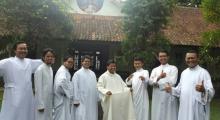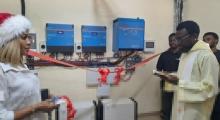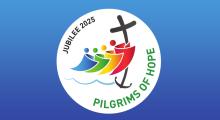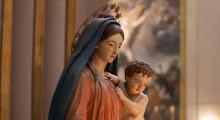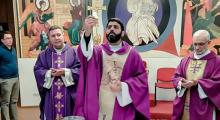Issued by the Catholic Center for Studies and Media - Jordan. Editor-in-chief Fr. Rif'at Bader - موقع أبونا abouna.org
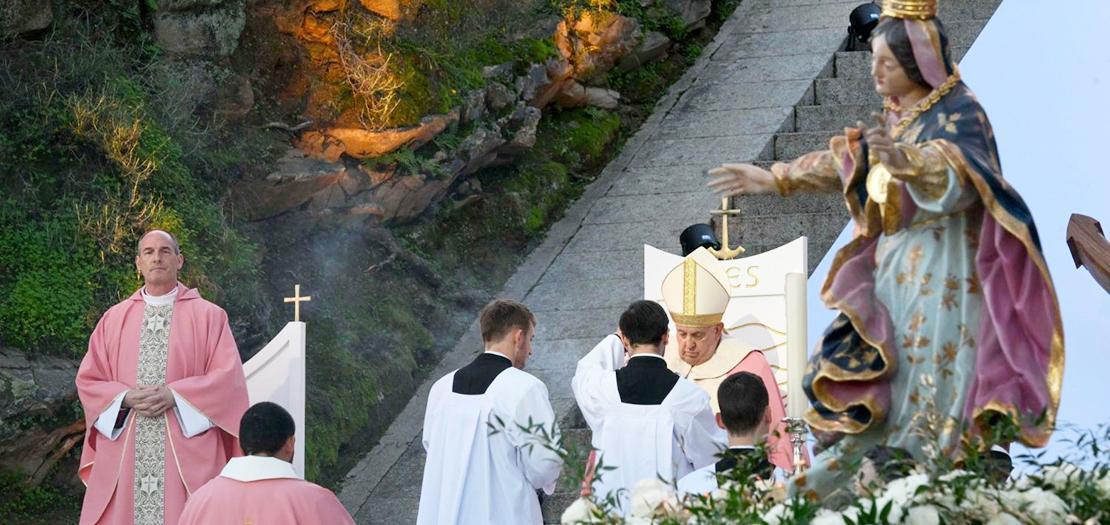
As the final public event of his one-day journey to Corsica, Pope Francis presided over Holy Mass in Ajaccio's Place d'Austerlitz.
Drawing from the words of John the Baptist, who proclaimed the coming of the Messiah, the Holy Father invited all present to embrace the message of spiritual renewal and conversion.
In this season of advent and reflecting on the question posed by the crowd to John the Baptist, "What then should we do?", Pope Francis noted that they remind us to reflect on our actions and attitudes in preparation for the Lord's arrival. The Pope noted that this question did not arise from those who were seen as righteous, such as the Pharisees and scholars of the law, but rather from those who were often considered "outsiders" such as tax collectors and soldiers. These people, who were tormented by their pasts filled with dishonesty and violence sought to change their ways. They were, in fact, ready to receive the call to transformation.
Pope Francis went on to remind the faithful that the Gospel message does precisely this: stirs the conscience of the most vulnerable, including the poor and the outcasts, drawn to Christ to be saved rather than condemned. He noted that in today's world, just as in the past, the call to conversion is always open to all, regardless of past failings. The question “What then should we do?” is one we are all invited to ask ourselves this Advent season, said the Pope, noting that it calls us to prepare with humble hearts for Christ’s coming.
The Pope went on to highlight two very different ways of waiting for the Messiah. The first, with suspicion, and the second with joyful expectation. Speaking first of suspicion, which the Pope described as being rooted in anxiety, distrust and a focus on worldly concerns, he said, prevents us from experiencing joy. The more we focus on ourselves, he said, the more we lose sight of God's providence. The remedy to this attitude, Pope Francis emphasised, lies in faith and prayer,
Speaking then of waiting for the Messian with joy, the Pope encouraged the faithful to embrace a joyful expectation of the Lord’s coming. Christian joy, he explained, "is neither shallow nor ephemeral". On the contrary, it is a joy rooted in the heart and built on a solid foundation. He recalled the words of the prophet Zephaniah, who called his people to rejoice because the Lord was in their midst, bringing victory and salvation. "The Lord’s coming brings us salvation: that is the reason for our joy", he said. This joy, the Pope explained, is not about forgetting life's hardships but rather finding strength and peace in the presence of God.
Bringing his homily to a close, Pope Francis acknowledged the great work of the local community of Ajaccio and in particular the Confraternities, whose charitable actions and devotion enrich the Church's life. He urged the faithful to continue serving the needy, embodying the joyful spirit of Christ in their works of mercy.
As the Advent season progresses, Pope Francis urged the faithful to cultivate peace and hope, particularly for young people preparing for Baptism and the sacraments. He reminded them that joy is the “style” of the Church’s proclamation, bringing the light of Christ into a world that so desperately needs it.
In frequent off-the-cuff remarks, the Pope invited the faithful to always look after the elderly, who carry the wisdom of the people. And commenting on the number of children present at the Mass, he also asked for particular care for the young, noting the many young people suffering from wars across the world, and in particular the children of Ukraine whom, the Pope says, "have forgotten how to smile".
In closing, the Holy Father addressed the challenges facing today’s world. "There are many reasons for sorrow and despair in today’s world", he said, listing "extreme poverty, wars, corruption and violence". Nevertheless, he continued, the word of God never fails to encourage us. Despite the suffering, "the Church proclaims an unshakable hope that does not disappoint", for the Lord is near, and in His presence, we find the strength to work for peace and justice. Joy in Christ, the Pope concluded, remains the source of our joy "in every time and amid every affliction".
Pope’s meeting with Macron concludes Corsica visit
"I thank you for this gesture of coming here. It reflects your personality, seeking dialogue. Thank you very much for the time you have dedicated to me," said French President Emmanuel Macron to Pope Francis shortly before he departed from Corsica.
The Pope and the President entered the small room at the Napolèon Bonaparte airport together, shortly before 6 pm. Accompanied by their respective delegations, they took their places in the room decorated with the flags of Vatican City, France, and Europe, and furnished with two chairs, one of them bearing the papal emblem.
As in previous audiences, at the Vatican or in Marseille in 2023 and at the G7 Summit, Macron expressed warmth toward the Pope.
He immediately presented him with the gift of a large book dedicated to Notre Dame Cathedral, recently restored after the devastating 2019 fire and reopened to the public just a week ago.
The Pope reciprocated with medals of his pontificate and documents from his magisterium.
Specifically, Francis handed over a copy of Evangelii Gaudium and found the page where Saint Thomas More’s recommendation—often repeated by the Pope in his speeches—is cited: to never lose one’s sense of humour. The Pontiff pointed out the passage for Macron to read. Macron responded with a smile and shook the Pope’s hand.
Seated next to each other, the two shook hands, and the French leader thanked the Pope for his visit, noting that he had witnessed the joy of the Corsican people, who were "very proud" to have welcomed a Pontiff.
Macron thanked Jorge Mario Bergoglio "on behalf of Corsica and France," while also acknowledging the suffering caused by a cyclone in the French archipelago of Mayotte, which claimed hundreds of lives and was remembered by the Pope during the Angelus.
This was followed by a closed-door discussion, marking the final act before the farewell ceremony at the airport, concluding a whirlwind visit that added a new chapter to the history of this Mediterranean island.


